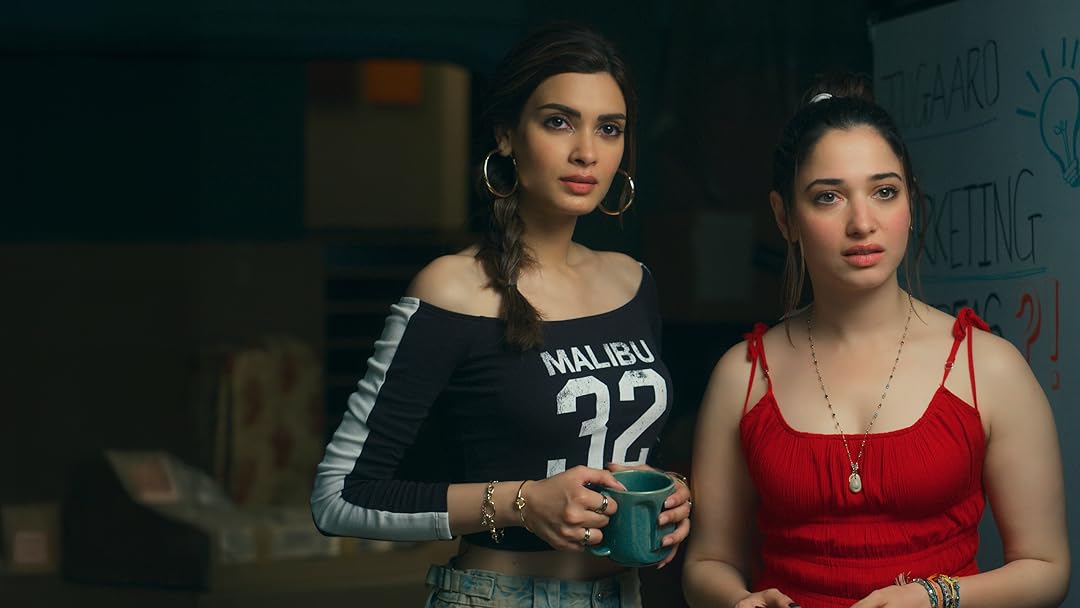Beer Cheer:
Two attractive women go on pub crawls in Gurugram, dressed in sexy outfits, and don’t get groped! That in itself goes into fairy tale territory.
Do You Wanna Partner directed by Archit Kumar and Collin D’Cunha — has an idea that seems a bit outdated, but it still had a charming energy to it, and actors who keep it fizzing (it is about beer, after all!). It is so predictable, that as each character is introduced, one can guess how their track will go, and what purpose they will serve. For once, it does not matter, because the two lead characters are such screen scorchers.
Shikha (Tamannaah Bhatia) is a “marketing stud” (their term) for an alcohol company, which is annexed in a hostile takeover by Vikram Walia (Neeraj Kabi), about whom she has painful childhood memories. Her best friend is Anahita (Diana Penty), a “finance genius” who quits her job in huff when a promotion she deserves does to a male colleague, and she is—insultingly– told that her contribution to the company is her smile.
It is Shikha’s dream to make beer, because her father (Indraneil Sengupta) had made “India’s first craft beer” called Gondogol (meaning confusion in Bengali) in his Kolkata garage. Walia had cheated him out of the recipe and trademark, so she bears an old grudge.
Turns out dealing with government departments and finding the right brewmaster – Bobby Bagga (Nakuul Mehta), in this case– is the least of their problems. The vendors they have to deal with, don’t believe that women are at the helm of a booze business. They all want to speak to their non-existent male boss. Shikha’s chef boyfriend Kabir (Rannvijay Singha) and even the eccentric single dad Bobby or some male pal would have served the purpose. but the two make up an AI generated David Jones, which convinces all but a female loan shark Laila (Shweta Tiwari), who wants to meet him in person.
Shikha recalls seeing her aunt’s boyfriend for hire, pretending to be a Frenchman—Jaaved Jaaferi putting his mimicry skill to good use. He is actually Dylan, an out-of-work stage actor, who lives in a crumbling Kolkata mansion, and is good with creating fake personalities. They decide to hire him to impersonate David Jones, realising too late that he has a memory problem—which, strangely, vanishes when he gets into the Mr Jones role.
The one-off meeting to fulfill Laila’s demand extends to months, and then using him for a successful marketing campaign. In this day and age, you can’t buy a railway ticket without ID, leave aside signing contracts; even after he becomes a celebrity, nobody in Kolkata seems to recognize him. The beer they make and name Jugaaro, because Anahita’s lisping fashion designer brother Firoo (Sufi Motiwala) can’t pronounce jugaad, turns out to be a hit.
Other complications arise, Walia won’t let go so easily, but, of course, the beer baronesses deal with all obstacles. The show still ends on a note that suggests the possibility of a second season.
The Dharmatic production, created by Mithun Gangopadhyay and Nishant Nayak, makes Gurugram look glam, as the two female stars swish around, in enviable outfits. Even within its candy floss universe, Do You Wanna Partner, brings in some seriously woke relationship issues, like Shikha feeling disrespected in the relationship, because she thinks Kabir does not take her career seriously enough. There is the overused, but also still valid glass ceiling problem that Anahita faces. Today, when artisanal beer, wine, mead and so on are made all over the place, and not only are companies owned and managed by women, but unlike a few years ago, many more women are bartenders, this plot is slightly implausible. Still the two women are allowed to fail, fight and get back on their feet without being judged. There is romance, but it takes a backseat to their ambition and friendship, which is a nice change. It is perhaps set in Gurugram, because Mumbai men are more accepting of women entrepreneurs. Do You Wanna Partner it is frothy and funny without being loud or crude, which is something so many Indian comedies cannot manage.
(This piece first appeared in rediff.com)

